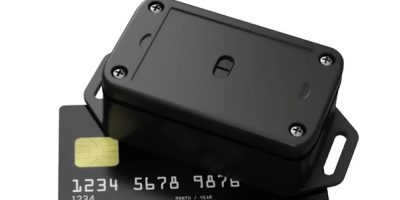Smart waste sensor module is world’s smallest, says adhoc networks
Measuring 71 x 43 x 28mm, the Oscar smart waste sensor module is the world’s smallest, said Adhoc Networks.
The sensor has a long battery life which combined with its size opens up a range of applications needing remote fill-level detection.
The optics can measure up to four metres within a container with a cone angle of 27 degrees to determine the fill level. They can be used as part of a local authority or private companies’ automated, fill-level detection and collection to reduce unnecessary collection trips to containers that are only partly filled.
The optical sensor in the device monitors the fill level in a waste container and sends that data for centralised processing to enable a schedule of waste collection to be created. Waste is only collected when the containers are full, reducing a collection fleet’s CO2 emissions by up to 40 per cent, reported adhoc networks.
“Knowing the exact level in every container ensures that there are no wasted collections of part filled containers and, even more importantly, no overflowing containers,” explained Ole Ostermann, adhoc networks’ CEO. The smart sensor module monitors new waste containers which are larger than previous models and which are located below ground level. “These are not currently easy to check the fill level apart from lifting a lid so they are usually emptied more often than necessary just to be sure, but that is a waste of resources,” explained Ostermann.
Oscar uses a Nordic Semiconductor nRF9160 SiP to collate data and send it to the cloud over the mobile network LTE-M and Narrowband-IoT. It is a low power device, using a 3.6V Li-thionyl chloride battery which has an operational life of up to five years based on, typically, twelve fill measurements a day and three uplinks of the data to the cloud.
Oscar replaces the company’s first-generation sensor, called Phil, launched in 2021 and currently in use by local authorities around the world.
The miniaturised version’s footprint is equivalent to a stack of around 10 credit cards, said Ostermann, which enables it to be used in small bins in parks, airports, as well as donated clothes, agricultural produce in storage hoppers or industrial materials such as plastic pellets used for injection moulding.




